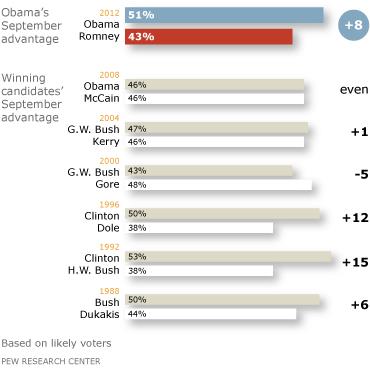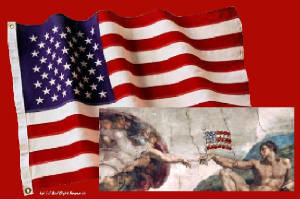|

Pew Research Center's Latest Prez Poll
Just Released: Obama's September
Advantage. According to our latest poll (conducted September 12-16, 2012), Obama has an eight-point lead over Mitt Romney among likely voters. This puts him in a strong position compared with past victorious presidential candidates. He holds a
bigger September lead than the last three candidates who went on to win in November, including Barack Obama himself four years ago. Read more: http://pewrsr.ch/UpbAlt
Pledging Allegiance...Under God?
And to the republic . . . whatever that is
A lot of people don't know that the man who wrote the Pledge of Allegiance
was a Baptist minister, and that he purposefully left out any reference to God. I didn't know. A teacher at a local high school
told me on Monday. She doesn't want me to use her name or to identify where she works because she's afraid that some of what
she has to say might reflect poorly on her students. -- by E.J. Montini, The Arizona Republic
A constitutional controversy arrived just in time for the 4th
of July -- in 2001, a federal court ruled that American school children should
not recite the Pledge of Allegiance because the phrase under God endorses religion. Whether flag-burning is constitutionally
protected is also being challenged in the courts. The revolution is not over...it's being fought in the courts.
Response to Court Decision on Pledge
There was an immediate furor in the United States, reported internationally,
including comments from the average person all the way up the line to American President George W. Bush.
It was only at the appeals level that this controversial decision was made;
now it will most likely go to the Supreme Court where it may -- or may not -- be reversed. Who knows? It won't be the first
time that the Pledge has been amended. The Pledge wasn't even recited in the public schools until 1892, almost 120 years after
America's independence from Great Britain was declared.
Atheists don't want 'God' included in anything compulsory in a country
that has declared that the government of the people should be kept separate from all religion. However, others who do believe
in 'God' or in a 'God' also see a problem with the Pledge's inclusion of these two little words. There are even some who think
that their allegiance to their 'God' prohibits them from reciting the Pledge at all. Jehovah's Witnesses took the government
to court and won the right to abstain from saying the pledge in public schools in 1953. This is not the first time that issues pertaining to the Pledge of Allegiance have been taken to court.
According to casual surveys, the majority of Americans believe that the
word 'God' is flexible enough to fit any religious belief and should be acceptable to all Americans, and that Atheists or
others who object should find these two little words harmless enough to overlook. However, when you consider this argument,
'God' could mean 'Jehovah', 'Allah', 'Zeus', or 'Odin' or whatever 'God' a person chooses to worship. Picture the following
scenario in order to imagine just how cloudy the issue really is: If all the citizens of the United States recited the Pledge
together, with each one substituting their chosen God's, Gods', or Goddess's name in place of the noun 'God', the results
would be confusing and unintelligible.
This appears to completely dilute or even contradict the meaning of the
word that immediately follows 'under God' in the Pledge: 'indivisible'. If we all can't agree on who God is and under whose
dominion we place our pledge to America, how can we possibly be an indivisible people? Is an agreement on who we worship essential
to be American? I sure hope not. -- Cat, the Editor
|
 |
|
|
|
 |
|
Every administration has blamed the last on economic woes. How did we
do then and how are we doing now?
| Ultimate Power: How Did the Economy Do? |
|
|
| Administrations Come & Go, & So Did the Cash |
Separation of Church and State

Related Links:
The Man Behind the Pledge
Case
November 10, 2003 -- Supreme Court litigants' personal stories usually take a back seat to momentous constitutional issues. In the Pledge
case, however, Michael Newdow's tangled tale remains front and center -- partly because his custody dispute is key to whether
he has standing to challenge the Pledge, and also due to his insistence that he should present the case. His demeanor could
lead the justices to appoint someone else to argue for him -- but his solitary persistence has paid off so far. (Legal Times)

|
| Free Screen Saver |
The flag's been hijacked and turned into a logo -- the trademark of a
monopoly on patriotism. On those Sunday morning talk shows, official chests appear adorned with the flag as if it is
the Good Housekeeping seal of approval. And during the State of the Union, did you notice Bush and Cheney wearing the flag?
How come?
No administration's patriotism is ever in doubt, only its policies.
And the flag bestows no immunity from error. When I see flags sprouting on official lapels, I think of the time in China
when I saw Mao's Little Red Book on every official's desk, omnipresent and unread.
I put it on to remind myself that not every patriot thinks we should
do to the people of Baghdad what bin Laden did to us. The flag belongs to the country, not to the government.
And it reminds me that it's not un-American to think that war -- except in self-defense -- is a failure of moral imagination,
political nerve, and diplomatic skill. Come to think of it, standing up to your government can mean standing up for
your country. What do you think?
-- Excerpts from an article from NOW with
Bill Moyers
History Of Pledge Of Allegiance
The Pledge of Allegiance, attributed to socialist editor and
clergyman Francis Bellamy, was first published in 1892 in The Youth's Companion, a children's magazine where he worked.
|
 |
|
|
|

